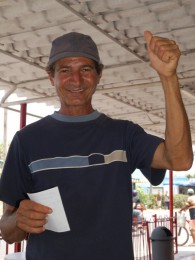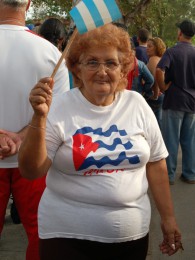Cuba, Part IV – In which Johnson has the last laugh
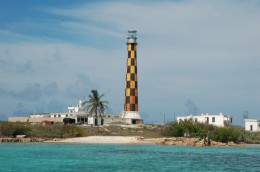
Last week’s article saw your intrepid travellers obstructed by obdurate officialdom.
Would we ever be able to step ashore again onto the pristine sandy islets which fringe the north coast, or would the Cuban government’s paranoia keep us at bay?
Cayo Francés
From Cayo Paredón we pressed on towards Cayo Francés, setting sail just before sunset and arriving the following evening, at about 17.00.
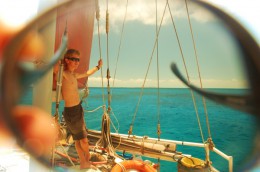
(Would-be visitors to this coast may like to note that, both on the night of our visit and on the night that we left, the lighthouse on Paredón was only operating in an intermittent fashion. Having come alive at dusk it whirled its beam of light around for a couple of hours, and then it went off until about nine or ten at night. The only other point of interest regarding this passage concerns the coral patches in the vicinity of Cayo Caimán. Some of these seem to have grown, and extended to seaward, since our 1999 chart was compiled.)
Our arrival at Cayo Francés was watched by the Guarda manning this outpost of the Cuban frontier and – predictably, as we now realised – we were not allowed to set foot ashore.
The anchorage was secure but completely unremarkable.
La Isabela
Well, if we couldn’t get ashore on the uninhabited islets, the next best thing would be to pay a visit to the mainland.
Having been unable to hire a car in Puerto Vita we decided to head for the port of La Isabela and then make our way overland to the nearby town of Sagúa la Grande. According to our cruising guides, a single track railway line united these two places.
In Sagúa we would either hire a car or else, if no car was available, we would take a train inland.
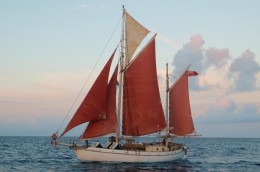
The western approach to Francés is open, and so we duly set off as night was falling, hopeful of arriving at our destination before the following evening. Unfortunately the wind soon fell away leaving us with empty sails and just the ever-present two knot current to ferry us onward.
By the time we reached the buoy which marks the channel leading between the cays and towards La Isabela it was three in the afternoon. Together the two yachts hardened sheets and went bowling towards the mainland. Our way was well-marked and there were no dangers.
Unsure – as ever – of what reception awaited us in Isabela, we made several attempts to contact the port over the VHF, but we got no reply. Eventually, however, somebody called us. Having taken our details the man asked, “Do you have a problem?”
“No, we don’t have a problem…”
“So… What is the purpose of your visit?”
“Tourism,” we replied confidently. In West Africa tourism is a magic word; it opens all doors. But the voice on the other side of the radio only asked us the question for a second time and then bade us, “Stop your engines”.
Our engines were not running. (Couldn’t the chap see our sails, we wondered?)
By now we were only a mile from the village. We had no mind to anchor – which was the only way of stopping – and then get the hooks up again, an hour later perhaps, to re-anchor nearer our destination.
We bowled on. The port arrived, complete with ruinous piers, huge derelict warehouses, and a few dozen cottages. We chose the perfect anchorage, off the most suitable landing place. We rounded up… and as we did so we discovered a small launch which was zooming up on our stern.
The launch was stuffed full of men clad in green or blue uniforms. I waved hello (eliciting a couple of non-committal nods in return) and made anchoring gestures. Somebody shouted their approval, and Nick dropped the hook. Scarcely had it found the seabed before the launch was alongside us and three men were stepping across onto our deck. Pretty much the first thing we noticed about them was that they had removed their boots and were wearing white ankle socks – and nobody who has the decency to take his boots off before he boards a vessel could possibly have any evil intentions.
Rules Must Be Obeyed
It soon became evident that the arrival of two yachts was probably the most exciting thing to have happened in this run-down place for about ten years – which was why the entire band of of the local Guarda had come to pay us a visit. But alas – as their front man explained straight away – we would not be able to stay.
“Why not?”
“Because the port is closed.” He smiled and patted the dog. “The piers are falling down, and so you cannot use them.”
“Oh, that’s okay; we don’t need to go alongside. We’re happy to remain at anchor.”
“Unfortunately that is not allowed; it would not be safe.” He continued to smile in a perfectly friendly manner.
“Don’t worry about that,” we told him. “We’ll happily sign a waiver; we’ll accept responsibility for our own security.”
“I was not referring to your security,” he answered – still with the same fixed smile on his face. “We have to protect our frontier. First I will look at your papers and search your boat, and then you must go.”
“But we can’t go now! It’s too late in the day.”
“Alas, you must. You may not remain within ten miles of this port.”
“Impossible! Before we are ten miles away it will be dark! We can’t go navigating amongst the coral in the dark!”
“Unfortunately you must go. It is impossible for you to stay.”
And, as ever, not one word of ours could make the man change his mind. The trouble is, even the nicest Cuban official is still implacably officious and utterly devoid of imagination or sentiment. That’s the way he is trained to be; that’s how he got the job.
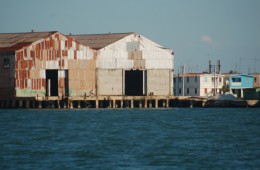
The fellow spent the next ten minutes wandering around our boat, opening lockers at random. Eventually he said, “Surely you have a Playboy magazine somewhere?”
On being told that we didn’t have any magazines aboard he took Caesar aside. “How old are you?” he asked.
“I’m 19.”
“So… Surely YOU have a Playboy magazine?”
“If we gave you a Playboy magazine would you let us stay for a day or two?”
“No.” Still the man smiled indulgently. “Alas, you cannot stay. It is impossible.”
Collision of the Regulations
Our pleading fell on deaf ears, but when he visited Cherub the officious little official almost found a way to overturn his own ruling.
“Why did you not answer me when I called you on the radio?” he asked.
“My radio isn’t working,” Johnson replied nonchalantly.
“What! No radio! You cannot navigate in Cuban waters without a radio. It is illegal. I must order you to remain here.”
Oh irony of ironies! One of us must go and the other must stay!
And if he had been made to stay Johnson would probably still, even now, be languishing in La Isabela. A boat without a radio must not be allowed to put to sea, but a foreigner must not be allowed ashore except via a marina – and so the hapless seafarer would be up the creek without a paddle!
A Mulish Law is an Ass
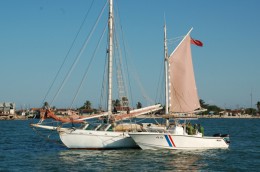
Believe me; it’s happened before: in Varadero we were to meet a Canadian sailor who got swept away from Florida in a gale and who was carried in amongst the Cuban cays. Within half an hour of tossing out an anchor he was “surrounded by gunboats”, as he told us, and he subsequently found himself and his boat impounded for illegal entry. The problem was that he had no passport.
Three weeks passed, and the fellow’s food and water were almost used up, before a passing US coastguard vessel happened to pick up his Mayday. (Imagine having to send a Mayday from the safety of harbour!) The Americans subsequently acted on behalf of the yachtsmen, and he was finally allowed to leave the boat, fly out of the country to get his passport, and then return to join his vessel.
And believe me – none of this will have occurred through any malicious feelings on the part of the Communist officials. Their policy and their education just don’t allow for any elasticity in the rules.
Happily the little man did not really want the bother of guarding a foreign vessel and so he persuaded himself to allow Cherub to leave, on condition that she never strayed more than half a mile from Mollymawk.
For the next two hours Johnson obeyed this ruling most stringently. Indeed, lacking not only a radio but an echo sounder too, he followed hot on our heels as we picked our way through the shoals which fill the wide blue expanse inside the cays.
When darkness fell we considered that it would be safe for us to anchor (the Guarda being unlikely to want to find us still in the vicinity of their precious port, and therefore very unlikely to pursue us). Ever mindful of the official warning given to him, our companion anchored Cherub so close to Molly that we thought it best to throw him a line and haul the boats alongside one another for the night.
Fortunately there was scarcely a breath of wind by now, and so the sea was unruffled. The stars shone down, but no other light or loom was visible anywhere, and nor was there any sound except that of the old seadog’s voice as he regaled us with one of his highly unlikely tales of past misadventure.
And so we passed another pleasant evening, sharing a meal of fish which the cherubims had caught on one of Johnson’s home-made lures – manufactured from a teaspoon – and checking to see that the rum, recently purchased in Puerto Vita, was as good as the stuff bought in Carriacou and in the Cape Verdes.
Arrecife Mégano de Nicolao
From our impromptu anchorage in the lee of Cayo Esquivél we set off, the following morning, for Arrecife Mégano de Nicolao.
What a mouthful!
Along the way we decided to search for a place where the ship’s divers could spend an hour exploring the reef, but although we identified a couple of likely spots – patches of coral which seemed, from the chart, to rise directly out of the depths – when we anchored and snorkelled over these places they were found to be rather uninteresting.
While the Mollymawks swam Cherub pressed on, until eventually we saw her round up into the wind and saw her jibs come down. Thus was the location of our next destination made very obvious.
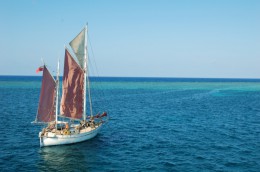
For a place with such a big name Mégano de Nicolao is a lot of fuss about almost nothing. It’s one of those places where a yacht can drop her hook seemingly in the open sea. The anchorage lies sheltered behind a crescent of yellow coral, and the only thing poking up above the sea is a rock measuring less than 3ft (1m) square. Presumably the seaward face of the reef is littered with wrecks…
Leaving the skippers to fiddle with bits of boat, the rest of us swam to the reef, struggling hard against the two knot current. A lone and rather large barracuda pursued us in a somewhat intimidating manner – until eventually we decided to link arms and form a wall, thereby facing him off.
Afterwards we gathered conch from the meadow of sea grass which flourished under our boats, and then enjoyed a hilarious half hour aboard Cherub, with Johnson providing instructions on how to remove, clean, and prepare the beasts for cookery.
(“Right, so first we make a hole, right here, with the hammer; and then we cut the meat away from the shell, with a knife; and then we simply pull him out… Like this… Come on, you bastard… Some of them are a bit tricky… Grrrr….”)
Cayo Blanco
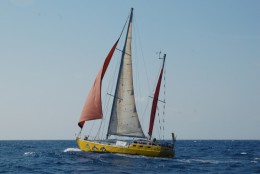
We might easily have passed a day or two at Mégano, but when morning came it brought with it the return of the tradewinds and the anchorage became rolly and rather unpleasant.
We set sail for Cayo Blanco. This island lies within sight of the Varadero peninsula, with its intensive hotel developments, and thus we imagined that it would be our last opportunity to be out in the sticks.
As it turned out we were wrong, because Cayo Blanco has already been claimed by the tourist industry. We found ourselves anchored for the night off a low-key, low-rise hotel and a lovely white sand beach adorned with a row of sun-beds. The only thing missing was the tourists. Not one was to be seen.
Varadero
The following morning we set off for the marina which lies at the root of the Varadero peninsula. In theory one can approach this marina either from the sea or from the sheltered lake which lies on the inside of the long thin sand spit.
In practice, we didn’t like the sound of the seaward approach – particularly not in the force seven wind which was now our lot.
“What do they think they’re playing at?” Johnson asked rhetorically, as he pored over the chart. “Only a complete and utter maniac would risk his boat on that lee shore!” he chortled.
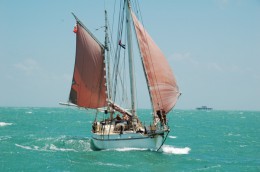
We bowled along beside the spit. It was somewhat reminiscent of La Manga, except that the developments were low-rise and therefore not as offensive as the Spanish ones. From the shore further to the south came the unpleasant odour of crude oil.
“I wonder what the tourists think of that? I can’t say that I’d be too pleased to be sniffing that scent all day long.”
“Perhaps it doesn’t matter. They do say that there’s a huge oilfield underneath Varadero; so if the tourists get fed up and go away, the oil men will move in.”
The distance between the spit and the mainland coast narrowed. Ahead of us we saw a wooded shore. This was evidently Cayo Siguapo, and our anchorage lay behind it.
We were running out of water, and so we dropped the mizzen and furled all but the last tiniest slice of the genoa. (The main had spent the day lashed to the boom.) Passing through the narrow gap between two markers we then rounded up promptly and dropped the anchor. Cherub joined us, and the two boats sat side by side on a neat little expanse of calm water surrounded by low trees. The marina lay half a mile away, up a man-made canal and on the other side of a lifting bridge.
“But this’ll do us. We don’t want to bother going into the marina. This is a nice little spot. We can stay here.”
Some chance!
The Show-Down
It took them all of ten minutes to come out to us. Pleasant as ever, they brought their launch alongside and came aboard in their stockinged feet.
“You cannot stay in this place,” said the officer in charge.
Here we go again.
“Look,” said I. “See this book? This is our cruising guide to Cuba. It was approved by your government. It says that we can anchor here.”
“No. You cannot stay here. Foreign vessels are only allowed to moor in the approved international marinas.”
“We don’t like marinas.”
“Foreign vessels are only allowed to moor in the approved international marinas.”
And so it went on.
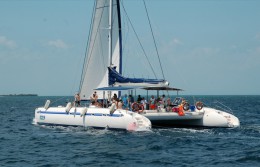
In Cuba, the word of law is immutable. It is intransigent, intractable, impregnable, invincible, stubborn, unyielding, unbending, uncompromising, and pig-headed.
Above all, Communist law is beyond question. The Cuban people must be the most docile in the world; they have been trained to obey the rules always. As a result, civil disobedience in others is a thing which these folk simply cannot understand. It astounds them.
The idea that he might bend the rules or turn a blind eye to our presence was almost beyond the Guarda captain’s grasp.
“Alright; alright!” We would have to accept the fact: the guide book was wrong; we were not allowed to anchor here; we would have to use the marina.
Then came the killer:
“In order to enter the marina you will have to sail round to the other side of the spit.”
“You’re kidding! No way! What’s the matter with this entrance?”
“This entrance is no longer in use. The lifting bridge is out of order. It has not been working for more than 15 years.”
There followed a long and heated argument. Cuban officialdom had ceased to be entertaining. The psychology of the nation no longer amused us. We were angry and we told the man so.
He was unmoved.
We pointed out that we couldn’t possibly travel from this place all the way round to the other entrance before nightfall. He agreed – we were fortunate enough to have met with a man who could balance immutable law with common-sense – and he granted permission for us to remain until the following morning.
We had gained an inch – but it was our only gain. We were ordered to remain exactly where we were. We must not launch our dinghies.
There was nothing for it; we were going to have to sail round to the opposite side of the spit and enter the marina via its ugly-looking seaward entrance.
“or maybe we’ll just leave.”
“That is not possible. You cannot leave without a despatcho, and to get the despatcho you will have to go to the marina. That is the law. If you try to leave without the despatcho you will be arrested.”
Next followed a conversation, by radio, with the marina manager. How much water was there in the entrance, we wanted to know?
“There is plenty of water. We have a lot of boats in here that are much bigger than yours.”
And is the entrance safe in this wind?
“It is perfectly safe in all weathers,” said the man.
Marina Acua
So off we went, on the morrow.
We beat out from behind the spit; we bowled down towards the marina on the back of the force seven wind; we arrived of the entrance and…
“Yikes!”
“Safe! He calls that safe!”
Two small, rather low walls jutted out into the sea, and over them the ocean waves broke with unabashed enthusiasm, throwing up great sheets of spray.
“That entrance is about as safe as a white water rafting on a lilo!”
At this same moment the marina manager’s voice broke into our conversation: “Vessel approaching the marina. Please spell your name and tell me your port of registry.”
Well, either we threw our boats at this lee shore and hoped for the best, or else we must head off into Bahamian waters, hoping to get there before the Cuban patrol boat caught up with us. We chose the stupid option and threw our boats at the tiny hole in the shore.
The engine was called into action, and the sails were dropped. Sails will only serve to pin the boat on the shore in these conditions.
“If the engine quits now…”
“Shut up.”
“I hope that homicidal moron was right about the depth. If we strike now…”
Roxanne was detailed to watch the echo-sounder and sing out the depths. Caesar had charge of the helm. Nick hovered close by. I positioned myself on the foredeck, all ready to run up and down like a headless chicken, should the need arise.
“Stick close to the windward wall, Caesar,” I hollered.
“I don’t want to go too close…”
“Stick too bloody close!” his father barked.
“Yacht approaching the marina. Please spell the name of your vessel,” said the radio.
“One-point-five.” said Roxanne calmly. “One-point-three. One-point-one. Nought-point-eight. Nought-point-seven…”
“Shit.”
But by now we were in amongst the breaking waves and it was too late to bottle out and turn away.
“Nought-point-four. Nought-point-three. Nought-point-two…”
“Oh shit.”
When the echo-sounder reads nought-point-two there are just 8″ (20cm) of water under Mollymawk’s keel.
The wall passed abeam of us, a biscuit’s toss upwind.
“Nought-point-four. Nought-point-six…”
“Hey! We made it!”
“Vessel approaching the marina, please answer me. I need to know how to spell your name.”
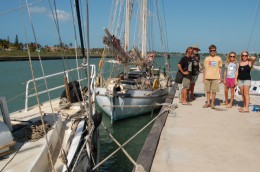
Needless to say, upon arriving in the marina, and having been directed to a suitable berth, we let the manager, the guarda captain, and everyone else within earshot know exactly what we thought about their All-Weather Entrance.
Caesar, with his fluent Spanish, was able to get the message across quite succinctly: “There are no big boats in here. And the entrance is very dangerous; we might easily have lost our boats. You’re a liar,” he said to the marina manager.
Well, even I wouldn’t have put it quite like that…! “Steady on, old son. We don’t want them throwing us out again…”
But happily Cuban officials are as impervious to slander as they are to pleading – the man just looked faintly surprised – and within ten minutes we were the best of friends.
Bongos and Buggies
Finally we had arrived at a venue where we were allowed to go ashore.
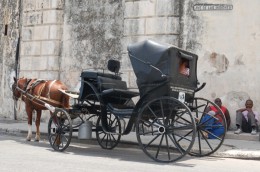
Since Varadero and the spit have been sacrificed to tourism we reckoned that there would be little here to interest us, and so we wasted no time in hiring a car. On the following day we drove to Havana, the famed capital of the country, and whiled away several hours strolling through the backstreets, hanging out where the bongo-players ply their trade, and riding in another horse-drawn buggy.
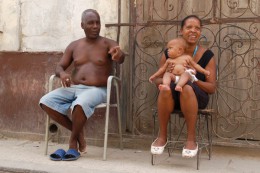
(These three pursuits are all highly recommended: the backstreets are the residence of ordinary folk, who sit in their doorways watching the veteran cars, the rickshaws, and the rest of the world trickle by; the liveliest bars are in Calle Ovispo, and the salsa bands which play here get their customers gyrating across the floor; meanwhile the buggies are the best way to tour the town – but be sure to haggle before you get aboard.)
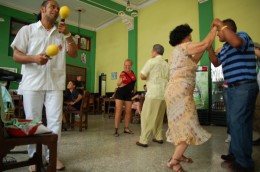
A subsequent tour of the interior in this part of the island turned up nothing of interest – nothing but flat countryside dotted with small, linear villages – but, as it turned out, there was plenty to see in the vicinity of Varadero, and we spent the next couple of days finding the least touristed bar, buying vegetables in the market, joining in when the salsa bands offered us their maracas and bones, and trying (and failing) to get a ride in a beaten-up, locals-only Cadillac taxi. (A pink one!)
And then it was time for us to be moving on.
The Last Laugh
We told the authorities that we wanted to leave the following day at 08.00, and so they duly began to turn up at 10.00.
Everybody was very nice. And nobody searched the boat, or even came aboard, which seemed odd. Our berth lay disturbingly close to the opposite bank of the canal, where any old Cuban might roam. Not that we found this disturbing – but we had assumed that the authorities might. We had thought that the whole point of this final palaver was to prevent us from smuggling Cubans out of the country.
The vet came to peer at Poppy. The port captain called us into his office and handed over a bill which amounted to $10 US per night. We were also required to pay a further 10 CUCs to the authorities for our outward clearance. The immigration people shuffled our passports and then handed them back.
“Have you finished?” Nick asked the last official as the man returned our papers.
“We’ve finished.”
“You don’t need to search the boat?”
“No, we’ve finished.”
Ever eager to be underway first, Johnson cast off his lines and trundled away along the canal. We hit the starter button on our engine – and nothing happened.
The chief engineer delved into the depths of the engine room.
Fifteen minutes later the engine roared into life. We began casting off our lines – and the Guarda rocked up.
Today’s representative of this most inflexible organisation was a tall skinny youngster barely older than Caesar. “Hey!” he shouted. “Where are you going?”
“Er… Did you want to visit us?”
“Where’s the other yacht?”
“Er…..”
Outrage, fury, and disbelief fought each other for control of the officer’s face as the horrible truth dawned upon him. “We haven’t cleared you out!”
Instant pandemonium broke loose. One would have thought that the Americans were invading, the way those Guarda ran around, shouting and barking.
It took ten minutes of shouting and running for them to get themselves organised, and then off they went in their fast launch – seven little boys, all armed with guns and vicious scowls – to fetch the naughty criminals back into harbour.
We tried calling on the VHF to warn Xoë and Paul of their faux pas, but they weren’t listening. Predictably…
Two hours passed, while we twiddled our thumbs; and then, finally, Cherub came ghosting around the corner under full sail – including the topsail. She was making about half a knot, and the launch was zig-zagging to and fro in her wake like an angry bee.
Tee, hee, hee!
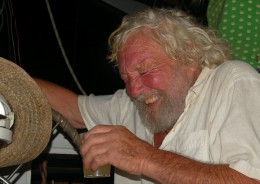
But unfortunately, in the course of taking the piss Johnson had also consumed a litre of vodka (rum is cheap, in Cuba, but vodka is even cheaper…) and so he was absolutely blotto. He couldn’t get the boat alongside – indeed, after the first attempt went wrong he refused even to try; he just sat down and fell asleep – and so we threw a line to Xoë and hauled the boat in to the jetty.
The officious little boy from the Guarda wanted to arrest Johnson, but we expressed outrage on his behalf – he being soundly asleep – and we talked a lot of nonsense about publicising the matter in the European press.
Eventually the affable marina manager, being very keen to avoid adverse publicity, was able to persuade the fellow to fill out the clearance form. This he did very sulkily, and without speaking a single word to any of us.
And then he ordered us to get out immediately – despite the fact that Johnson couldn’t even stand up!
Fortunately the sails were still set, so that all Xoë had to do was point the boat down the canal towards the entrance.
And so we said adiós to Cuba.
I’ll be going back, for sure – the schizophrenic combination of open-hearted friendliness and unbending paranoia is fascinating – but Johnson won’t; and his tales will now be spiced with a new one, about how he was very nearly locked up forever by the Commies.

